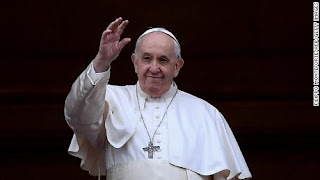 |
| Pope Francis |
As the calendar turned from one year into another, Pope Francis and the Catholic Church went into a good news-bad news cycle that has left ill feelings around the world -- and that's too bad for the world and the influence of religion. Before Christmas 2021, it is worth remembering, Pope Francis offered seemingly heart-felt wisdom about the three key words to a stable marriage. It's also worth noting that similar words and phrases can help strengthen all human relationships -- whether they involve marriage or not. Unfortunately, in early 2022, the Pope might have trashed the good will generated from those words by labeling as "selfish" couples who have pets but no children.
As for the good-news portion of our post, this is from a report at Associated Press:
Pope Francis sought . . . to encourage married couples, acknowledging that the pandemic has aggravated some family problems but urging couples to seek help and always remember three key words in a marriage: “Please, thanks and sorry.”
Francis penned a letter to married couples that was released [on] a Catholic feast day commemorating Jesus’ family. It came halfway through a yearlong celebration of the family announced by Francis that is due to conclude in June with a big family rally in Rome.
Speaking at his studio window, Francis said he intended the letter to be his “Christmas present to married couples.”
In an Axios e-newletter, a reporter sought to take the idea beyond the boundaries of marriage. The Pope's message is strong, but the one from Axios might be even better. Husbands and wives, after all, aren't the only ones who sometimes struggle to communicate:
I'd add to the list: "You're right" ... "I'm on it" ... "Good point" ... "What can I do?" ... "I hadn't thought of that" ... "I hear you" ... "I was wrong." Those help almost every time. Also magical in the workplace. After sparking dialogue on words meant to boost human interaction, it was sad to see the Pope follow up in early 2022 with nonsense about pets and children. From a CNN report on the subject:
Shockingly, the Vatican did not consult me on these issues. But I would offer to be the Pope's editor, because he apparently needs one. A few thoughts I might have tossed out for the Pontiff's consideration: * I don't think most couples see pets-children as an either-or-proposition. Many have both and find it rewarding to "raise" both; * Some couples simply cannot have their own biological children for health reasons. Others might be open to adoption but perhaps fear that route might be fraught with peril; * Domestic animals, those who aren't equipped to live outside in the elements, need human kindness to survive. I'm hardly an evolutionary biologist, but my understanding is that dogs and cats descended from wild animals, and humans domesticated them and have benefited from their presence for centuries -- so in may ways, we owe them. To take them in and treat them as members of the family is an act of God's love, a truly "unselfish" act. * This should be obvious, but children don't fall out of the sky with a snap of the fingers. It requires two processes -- pregnancy and childbirth -- that fall 100 percent on women and can be filled with complications, even life-threatening danger. We should think twice before declaring that giving birth is a requirement of womanhood. Women should not feel forced to take on roles that some might not want to handle. * In an act of self-honesty, some people probably realize that they might not be good parents -- or that their circumstances would make parenting extremely difficult. Is it a bad thing if these people choose to pass on parenting and perhaps engage in activities that they find rewarding and also boost society? I would say no. In a world where many people have come to appreciate the many emotional and physical benefits pets bring us, the Pope's words did not sit well with many. From a report at The Guardian:
|
11 comments:
Sounds like the Pope made the child-pets remarks in an impromptu general audience. I'm taking that to mean he was speaking off the cuff. Maybe he should stick with prepared remarks.
You might be right, @10:37. I'm not certain about the format, but it sounds kind of like a question-answer session. Not sure if Popes generally do that kind of thing or not. But it does sound like he didn't think his thoughts through very well.
My understanding is that this Pope has made these sorts of comments before. You'd think he would learn to riff on something else.
Yes, it's just a topic filled with minefields. To my ears, the whole child-pets comparison sounds like what you might call a false equivalency. I'd say that makes the argument doomed from the start.
I suspect the Pope would be better off by focusing on the value of all life, rather than placing one form over another.
A number of commenters have noted the comments are odd coming from a Pope who is generally seen as progressive and draws high marks for building good will -- as with his remarks about marital communication.
I think the Pope's biggest problem comes from labeling childless couples as selfish. There's just no reason to do that.
You make a great point, @11:00. Take the "s word" out of the discussion, and the comments probably go over quite a bit better.
Lots of comments at Twitter re: Pope Francis. Here is a sampling:
@KWLanning
This public school teacher who chose not to have children but has devoted her life to other people's kids and helping animals wou
The Beaverton
@TheBeaverton
"Not having kids is selfish" says man who lives alone in golden palace
Current world population:
7,918,624,928
Not sure lack of humans is a problem.
Post a Comment